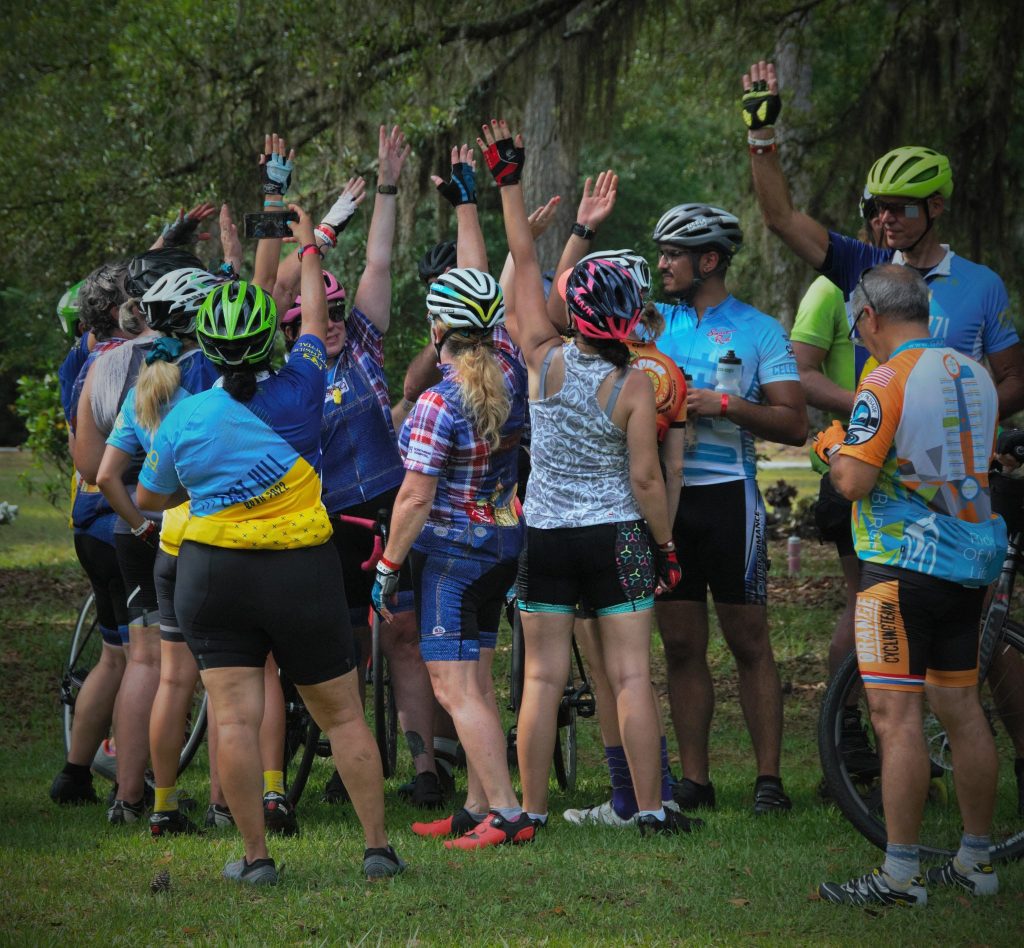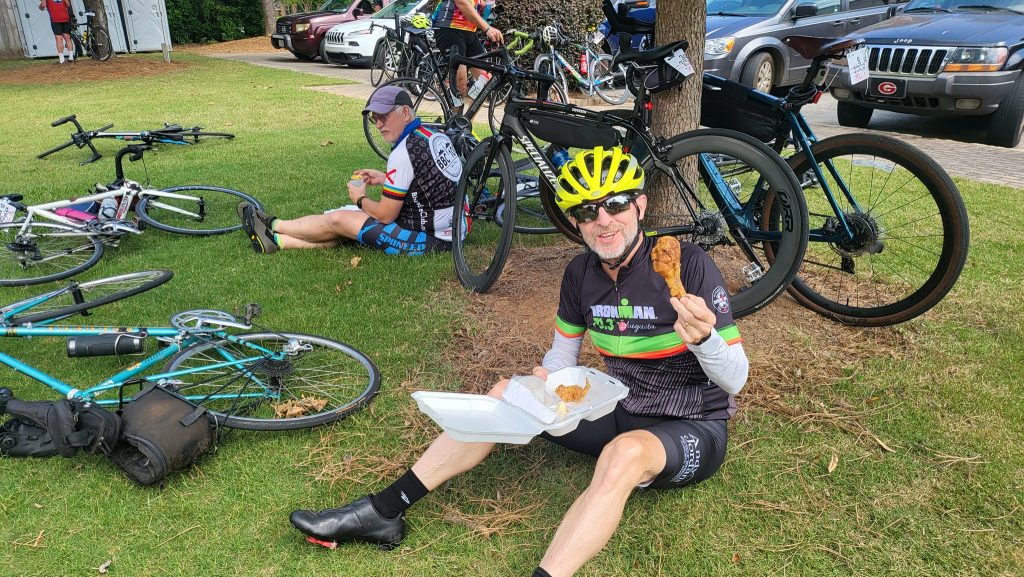When cyclists roll through small towns and rural communities during organized bike tours like BRAG’s (Bicycle Ride Across Georgia) Big BRAG or Spring TuneUp, they bring more than just spinning wheels and colorful jerseys. They bring economic opportunity, cultural exchange, and community pride that can transform local areas in meaningful and lasting ways.
Economic Impact That Goes Beyond the Numbers

The numbers speak for themselves: bicycle tourism accounts for an estimated $83 billion in trip-related spending nationally, according to the Outdoor Industry Association. The most immediate way bike tours support local communities is through direct economic spending. When hundreds or thousands of cyclists descend on a small town, they need places to eat, shop, and often stay overnight. Local restaurants see packed dining rooms, convenience stores experience surges in sales, and hotels fill up with visiting riders and support crews.
A compelling example comes from RAGBRAI (Register’s Annual Great Bicycle Ride Across Iowa), which generates approximately $25 million in direct spending annually, with studies showing that 70% of participants are tourists rather than locals. As one RAGBRAI host town noted, “This event exposed our destination goes beyond traditional tourism impacts and is much more than the one week” of the actual event.
But the economic impact extends far beyond these obvious transactions. Bike tours often partner with local organizations, hiring community groups to provide services like luggage transport, rest stop management, or event setup. These partnerships put money directly into the hands of schools, churches, civic organizations, and local businesses that might not otherwise have such opportunities.
Many communities also use bike tour visits as a catalyst for infrastructure improvements. Knowing that cyclists will be passing through, towns often invest in bike-friendly amenities, better signage, or streetscape improvements that benefit residents long after the riders have moved on.
Supporting Rural Economic Development
Research from CalBike highlights that bicycle tourism represents a particularly valuable opportunity for rural and disadvantaged communities, favoring locally-owned businesses where proceeds remain in local hands rather than flowing to distant corporate headquarters. The Adventure Cycling Association notes that touring cyclists tend to seek out local establishments and experiences, making them ideal visitors for small communities looking to develop sustainable tourism.
Showcasing Hidden Gems and Local Culture

Beyond the economics, bike tours have a unique ability to spotlight communities that might otherwise be overlooked by travelers. Unlike highway-bound tourists who zip past small towns, cyclists experience places at a more intimate pace. They stop at local cafes, chat with residents, and discover the unique character that makes each community special.
This exposure can have lasting benefits for tourism. Cyclists often return to favorite spots they discovered during tours, bringing family and friends. They share photos and stories on social media, effectively becoming ambassadors for the communities they’ve visited. Towns that might never appear in traditional travel guides suddenly find themselves featured in cycling blogs and recommended by tour participants.
Building Community Pride and Engagement
There’s something special that happens when a community comes together to welcome visiting cyclists. Residents often volunteer to help with rest stops, offer directions, or simply cheer riders on from their front porches. These interactions create a sense of community pride and engagement that extends well beyond the event itself.
Many towns use bike tour visits as rallying points for community improvement projects. The prospect of hosting cyclists motivates residents to beautify their downtown areas, organize community events, or develop new recreational amenities. These efforts benefit everyone in the community, not just the visiting riders.
Supporting Local Agriculture and Food Systems
Bike tours provide unique opportunities to connect cyclists with local food producers. Many tours feature rest stops at farms, farmers markets, or restaurants that source ingredients locally. This creates direct economic benefits for agricultural producers while educating cyclists about regional food traditions and sustainable farming practices.
Some communities have developed entire food tourism strategies around bike tour visits, featuring local specialties, organizing farm tours, or creating partnerships between restaurants and local producers. These initiatives can create lasting economic opportunities in rural areas where traditional industries may be declining.

Environmental Benefits and Awareness
By their very nature, bike tours promote environmentally sustainable transportation and recreation. Communities that host bike tours often become more aware of environmental issues and more committed to sustainable practices. This can lead to investments in renewable energy, recycling programs, or conservation initiatives that benefit the entire community.
The presence of cyclists also demonstrates that communities can attract visitors without relying on high-impact tourism that strains local resources or damages natural areas. This can help communities develop more sustainable approaches to economic development.
Creating Lasting Partnerships
Perhaps most importantly, bike tours often create lasting partnerships between cycling organizations and local communities. These relationships can lead to ongoing support for community projects, regular return visits, or recommendations to other touring groups.
Many communities that successfully host bike tours find themselves becoming regular stops on multiple cycling routes, creating a reliable source of tourism revenue and community engagement. They develop expertise in bicycle tourism that they can share with other communities and build networks of bicycle-friendly destinations.
Looking Forward
As bicycle tourism continues to grow, the potential for positive community impact only increases. The national bicycle recreation economy supports nearly 1.1 million jobs across the U.S. and generates $17.7 billion in annual federal and state tax revenue, according to research compiled by Focus Outdoor Advisors. Communities that embrace bike tours and develop bicycle-friendly amenities position themselves to benefit from this growing market while creating assets that improve quality of life for residents.
The relationship between bike tours and local communities is truly symbiotic. Cyclists get to experience authentic local culture and hospitality, while communities gain economic benefits, increased visibility, and opportunities for engagement and improvement. It’s a model of sustainable tourism that creates value for everyone involved.
For communities considering hosting bike tours, the message is clear: the benefits extend far beyond the day the cyclists roll through town. The investments in hospitality, infrastructure, and community engagement can pay dividends for years to come, creating stronger, more vibrant places to live and visit.
Sources: Adventure Cycling Association Economic Impact Studies, Outdoor Industry Association Tourism Data (2018), CalBike Rural Development Research, RAGBRAI Economic Impact Studies, Focus Outdoor Advisors Bicycle Recreation Economy Report
